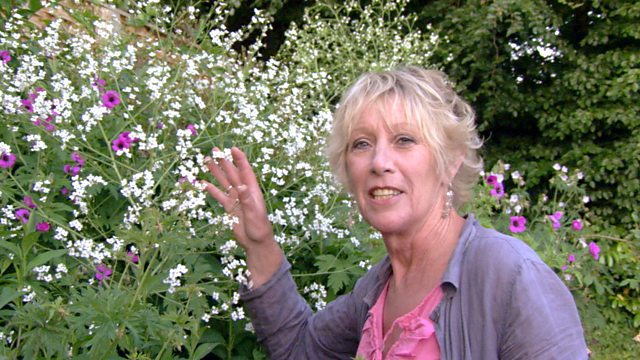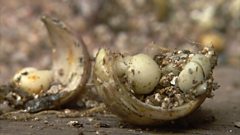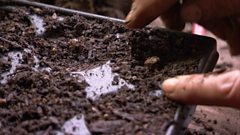
Summer
Series following a year in Carol Klein's garden in Devon. It is summer and the garden is at its most abundant, with cannas and dahlias providing an explosion of colour.
It is summer and the garden is at its most abundant. The fragrance of lilies fills the air, and glorious colour abounds. To keep the garden at its best, there's deadheading to be done, plants to stake - and looking ahead, Carol begins to take cuttings of her favourite herbaceous perennials.
Carol also sets to work in her hot borders to stage the hot tender exotics she has carefully grown on under cover. Cannas, gingers, and dahlias are all carefully planted and placed out to create a sizzling explosion of late summer colour.
Summer would not be complete without a trip to the seaside. Carol takes a walk along the dunes of her local beach, Braunton Burrows, to seek out a plant she would dearly love to grow in her own garden, eryngium maritimum, our native sea holly.
Last on
More episodes
Previous
You are at the first episode
See all episodes from Life in a Cottage Garden with Carol Klein
Clips
-
![]()
Scaling lily bulbs
Duration: 01:38
-
![]()
Carol takes root cuttings
Duration: 01:37
Location visit: Braunton Burrows

Summer would not be complete without a trip to the seaside. Carol takes a walk along her local beach, Braunton Burrows, which sits on the western edge of the Atlantic Ocean.Μύ
The Burrows are an internationally significant shifting dune ecosystem, where nearly 500 species of wildflower have been recorded. Carol finds here a plant that she would love to grow in her own garden, eryngium maritimum, our native sea holly.
Μύ
Compost

As Carol says, compost is at the heart of everything she does in her garden. She does not feed her plants but feeds the soil. Compost improves soil structure it also adds valuable nutrients that over time will be released to the benefit of your plants.Μύ
Whether your garden is acres or the tiniest of plots, composting can be accommodated into any garden. It is sustainable, good for the environment and truly good for your garden.
Μύ
Hot border exotics

Carol’s Hot Borders are a late summer extravaganza of hot exotic colour. Sinuous box hedges run the length of the borders and are underplanted with herbaceous perennials like euphorbias, rudbeckias and crocosmia.Μύ
This is just the start; Carol has a trick up her sleeve. Under cover, she grows on lots of tender exotics like, cannas, dahlias and bananas and when they are in their prime and the weather is warm she carries them down triumphantly and places them out to bring a hot zing to her late summer garden.
Μύ
Eryngiums

Whilst Carol would love to grow our native sea holly, eryngium maritimum, the conditions in her garden are not quite right for it to thrive.Μύ
Instead she grows eryngium bourgatii. A plant of the Mediterranean, it enjoys a moderately fertile soil but must have a very free draining situation, so with its steely blue flowers, foliage and stems it looks perfect growing in Carol’s raised bed.
Μύ
Taking cuttings

Taking cuttings is perhaps the easiest method of propagating plants.Once you first succeed, you see those new roots appear, taking cuttings becomes addictive.Μύ
As Carol says, you want more and there is always room in the pot for a few cuttings more. The real benefit to the gardener is that a favourite plant can be increased in numbers rapidly and any extra plants can then be shared with friends and fellow gardeners - try it and see.
Μύ
Credits
| Role | Contributor |
|---|---|
| Presenter | Carol Klein |
| Executive Producer | Gill Tierney |
| Executive Producer | Sarah Moors |
Broadcasts
 Fri 11 Jan 2013 20:30Βι¶ΉΤΌΕΔ HD & Βι¶ΉΤΌΕΔ Two
Fri 11 Jan 2013 20:30Βι¶ΉΤΌΕΔ HD & Βι¶ΉΤΌΕΔ Two- Sun 13 Jan 2013 08:15
- Sun 20 Jun 2021 06:00Βι¶ΉΤΌΕΔ Two except Scotland
- Tue 24 Aug 2021 03:15Βι¶ΉΤΌΕΔ Two except Scotland
- Sun 12 Feb 2023 07:30Βι¶ΉΤΌΕΔ Two except Scotland
- Mon 4 Nov 2024 15:45Βι¶ΉΤΌΕΔ Two except Scotland
Featured in...
![]()
Βι¶ΉΤΌΕΔs & Gardens
A variety of programmes showcasing interior home and glorious garden designs



